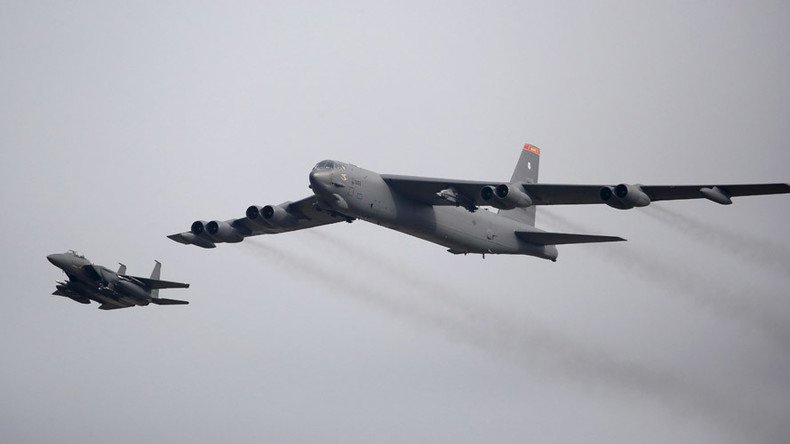Half-century old B-52s warplanes now delivering ‘precision strikes’ against Islamic State

B-52 bombers old enough to order from a 24-hour diner’s senior discount menu are now conducting “precision strikes” over Iraq and Syria against Islamic State – and the upgraded warplanes still have a long life ahead of them, US military officials say.
An Islamic State (IS, formerly ISIS/ISIL) weapons storage facility in Qayyarah, Iraq was targeted by a B-52 firing guided bombs on Monday, Colonel Steve Warren, spokesman of Operation Inherent Resolve, the US mission against IS, told Agence France-Presse (AFP) on Wednesday.
First in 3 decades: US deploys #B52 bombers to Qatar to bomb #ISIShttps://t.co/7q0FO2W1Inpic.twitter.com/2ZZuori5J4
— RT America (@RT_America) April 9, 2016
A B-52’s full name is the B-52 Stratofortress. Introduced in the 1950s, many with around 55 years under their belts still fly – a testament to their engineering. The B-52 bomber is pictured in the movie Dr. Strangelove, but its real history in several war zones over the decades is also remembered by many. The plane has been through some changes, however, including in the weapons it delivers.
“There are memories in the collective unconscious of B-52s, decades ago, doing ... arguably indiscriminate bombing,” Colonel Warren told AFP. “Those days are long gone. The B-52 is a precision strike weapons platform and it will conduct the same type of precision strikes that we have seen for the last 20 months.”
Some 15,000 tons of non-precision bombs were used to carpet Cambodia, Laos, and North Vietnam during the Vietnam War.
While the B-52 is replacing the younger B-1 warplanes that have been flying bombing missions against IS over the past year, it remains unclear when the B-52 will be replaced. Some B-52s, depending on their mission, will soon be upgraded to carry more GPS-guided bombs and superior radar.
Northrop Grumman is working on a new generation of such bombers which are to be called Long Range Strike Bombers, but that program was only announced in October and is expected to take at least a decade to be realized at a cost that could exeed $100 billion. B-52s could very well outlast that program’s development stage, however, and possibly even remain active through their 100th birthday, some believe.
“The [B-52] airframe itself remains structurally sound and has many useful flying years ahead of it,” an anonymous military official told Wired. “Most of the B-52 airframes are original and their longevity is a testimony to the original design engineers.”
“Its flexibility has led to its continued relevance and ability to adapt to current and emerging global threats,” the official added.
US B-52s to perform ‘not normal’ exercises in Norway https://t.co/StU4ytIrv5pic.twitter.com/DuulmcQ7EN
— RT America (@RT_America) March 3, 2016












